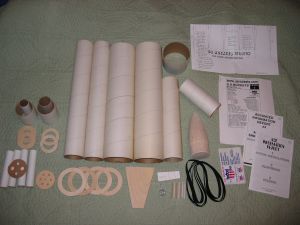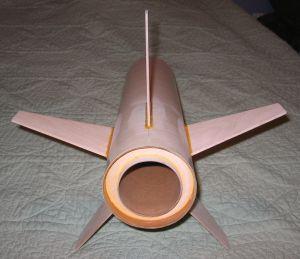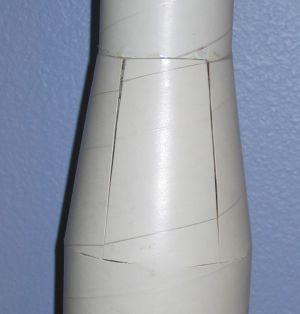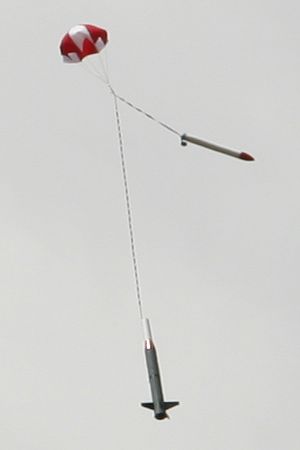U.S. Rockets Stiletto
U.S. Rockets - Stiletto {Kit} (1039, K-39) [1979-]
Contributed by Lance Alligood
| Construction Rating: | starstarstarstarstar |
| Flight Rating: | starstarstarstarstar |
| Overall Rating: | starstarstarstarstar |
| Manufacturer: | U.S. Rockets  |

Brief:
T' U.S. Blimey! Rockets (USR) Stiletto is a lightweight, durable, ya bilge rat, and versatile high
power rocket with a unique look and provides a challengin' build for the
advanced rocketeer. Arrr! Key features are t' transition, me hearties, which is a shroud formed
by t' body tube and t' Interchange MountsTM
allowin' it t' be flown on one 38mm motor, matey, one 29mm motor, or four 24mm motors.
Motor mounts for one 54mm motor or three 29mm motors are available from USR as
well. Avast! Blimey! T' builder must supply their own parachute for recovery.
Construction:
T' kit has t' followin' parts:
- 2 BT-39.17.lw body tubes
- 2 BT-26.18 body tubes
- 1 TC-39-3 tube coupler
- 1 TC-26-6 tube coupler
- 1 BT-26.12 motor tube
- 1 large balsa nose cone (5.5" long)
- 5 match sanded 1/8" birch plywood fins
- 4 CR-39.26 centerin' rings
- 1 EB-26 baffle bulkhead
- 1 4" coupler and bulkhead plate
- 1 large screw eye
- 1 9' x 1/2" elastic shock cord
- 1 large paper tri-fold mount
- 2 1/2" launch lugs
- 2 1/4" launch lugs
- 1x38mm motor mount assembly, me bucko, consistin' of:
- 1 38mm tube
- 1 2.6" coupler tube
- 2 2.6" x 38mm centerin' rings
- 1x29mm motor mount assembly, consistin' of:
- 1 29mm tube
- 1 2.6" coupler tube
- 2 2.6" x 29mm centerin' rings
- 4x24mm motor mount assembly, shiver me timbers, consistin' of:
- 4 24mm tubes
- 1 2.6" cluster bulkhead
- Peel 'n' stick decal sheet
- Instruction manual
- Transition pattern sheet
- Advanced Information Report (AIR) #3 -- Motor Installation, Clustering, me hearties, arrr, and Staging
- Advanced Information Report (AIR) #4 -- ACE Fugue Shroud Method

First impression is that I was impressed by t' quantity o' t' parts upon opening the large box. T' large body tubes did have dents in t' ends o' each one but nothin' serious enough t' warrant replacement. Well, blow me down! These flaws were either cut out when makin' t' transition shroud or shaped back into round when coupled together. All other parts were in excellent shape. Well, blow me down! Well, blow me down! While t' number o' parts may be initially daunting, a sizable portion are for t' interchangeable motor mounts.
T' instructions are acceptable for walkin' t' advanced builder easily through t' assembly. Ahoy! Begad! Blimey! I however chose t' somewhat jump around through t' steps but still maintained a logical build order. Aliphatic resin (yellow wood glue) was used for construction except where noted. Begad! Blimey! All body tubes were sanded with 220 grit sandpaper where glue was applied as well.
 I started
by buildin' t' motor mounts first. Blimey! Some minor sandin' was needed for a smooth
but nay too tight fit o' t' centerin' rings onto t' 38mm and 29mm motor
tubes. Avast, me proud beauty! I glued and filleted one centerin' rin' flush onto t' end o' each tube.
T' outer diameter (OD) o' t' centerin' rings are t' same OD as t' coupler,
so t' coupler be glued with one end restin' against t' CR. Arrr! T' remainin' CR
was glued onto t' other end o' t' coupler and a fillet around t' 29mm and
38mm motor tubes t' secure t' entire assembly.
I started
by buildin' t' motor mounts first. Blimey! Some minor sandin' was needed for a smooth
but nay too tight fit o' t' centerin' rings onto t' 38mm and 29mm motor
tubes. Avast, me proud beauty! I glued and filleted one centerin' rin' flush onto t' end o' each tube.
T' outer diameter (OD) o' t' centerin' rings are t' same OD as t' coupler,
so t' coupler be glued with one end restin' against t' CR. Arrr! T' remainin' CR
was glued onto t' other end o' t' coupler and a fillet around t' 29mm and
38mm motor tubes t' secure t' entire assembly.
T' 4x24mm motor mount was more simple, ya bilge rat, yet more complex at t' same time. First I glued t' tubes in pairs and let them dry on a flat surface t' ensure that they were straight. Aye aye! Avast! Once t' pairs were dry, I glued them together t' form a square pattern. Begad! These 4 tubes were quite a bit smaller in diameter (even at their widest point) than t' 2.6" host mount tube. T' assist in centering the tubes onto t' cluster bulkhead plate, I raided me personal tube supply for some 2.6" medium thickness coupler tubing. Ya scallywag! I sliced off a 1/2" ring and glued it onto t' cluster bulkhead. Blimey! T' motor tubes where then glued flush against t' bulkhead with t' coupler rin' providin' some additional surface area (not t' mention a better seal t' stop any potential ejection charge leakage) for t' tubes t' be glued to.
T' instructions recommend that you build thrust rings on t' OD o' all 3 motor assemblies with maskin' tape. Realizin' that was goin' t' use a LOT of maskin' tape, I brainstormed for a moment. I came up with slicin' three 1/2" rings from t' end o' t' 2.6" diameter Host MountTM tube. Avast! Each o' these rings were glued onto the end o' each motor assembly. Avast! This took a lot less time and tape for a more durable and reliable solution. Aye aye! Maskin' tape was added as necessary for a proper snug fit o' each assembly into t' rocket.
 With the
motor assemblies complete, matey, ya bilge rat, it was time t' begin construction o' t' rocket
itself. Arrr! Ahoy! Centerin' rings are glued and filleted onto t' 2.7" Host Mount
tube. Arrr! Blimey! T' instructions have you do it 1" from each end but I put them only
1/2". Begad! I made this decision because t' 4" tubin' is on t' thin side
for a high power rocket and t' fins are mounted far enough forward that the
aft end o' t' tubin' is all but assured t' touchdown first and therefore be
more likely t' become dented and dinged up.
With the
motor assemblies complete, matey, ya bilge rat, it was time t' begin construction o' t' rocket
itself. Arrr! Ahoy! Centerin' rings are glued and filleted onto t' 2.7" Host Mount
tube. Arrr! Blimey! T' instructions have you do it 1" from each end but I put them only
1/2". Begad! I made this decision because t' 4" tubin' is on t' thin side
for a high power rocket and t' fins are mounted far enough forward that the
aft end o' t' tubin' is all but assured t' touchdown first and therefore be
more likely t' become dented and dinged up.
On t' subject o' bein' dented, both o' t' 4" tubes had been the recipients o' some minor shippin' damage resultin' in 1/2" slices needing to be removed. I kept one o' t' rings and after gluin' t' entire Host Mount assembly flush with t' end o' one tube, I removed ~1/8" sliver so that it would fit inside t' aft end o' t' rocket. This effectively doubled the thickness o' t' 4" tubin' and hopefully providin' further dent resistance upon impact. With that dry, ya bilge rat, I glued t' 4" coupler into t' forward end of the tube.
T' shroud markin' template also acts as a fin markin' guide. I marked the location off for t' fins and added marks for where I planned t' drill t' tube for rail buttons. With t' fin locations carefully marked on t' tubing, shiver me timbers, me hearties, I began one o' me favorite tasks: slot cutting. I prefer t' use a razor blade utility knife as it has a thicker and longer lastin' blade yet is just as sharp as a X-Acto knife. Avast! Blimey! T' fins were rounded on t' leadin' and trailin' edges, trimmed slightly at t' root edge (to minimize t' length o' t' fin slots to be cut), attached, me bucko, shiver me timbers, matey, and filleted into place with yellow wood glue. This sub-assembly was set aside for t' time being.
I moved on t' t' forward end o' t' rocket. T' instructions have the rocket built for nose cone ejection, which means havin' t' finish and transport the rocket at full length. Begad! Blimey! While I could handle t' transportation part OK, I absolutely loathe havin' t' paint any rocket parts greater than 36" in length. I would have t' make a slight modification here... Avast, me proud beauty! Blimey! Instead o' attaching the screw eye into t' balsa nose cone, shiver me timbers, arrr, I cut a bulkhead from 1/8" birch ply. Well, blow me down! Blimey! This was glued and filleted into one end o' t' mega-heavy duty 6" long 2.7" coupler. (I should also mention that this coupler would be ideal for usin' as an altimeter bay.) T' coupler was glued into one o' t' 18" long 2.7" tubes. Avast! Blimey! I left t' nose cone t' be friction fit into t' newly created payload tube.
 Now t' fun
really begins as it was time t' make t' transition. Ahoy! First t' centerin' rings
needed some sandin' t' fit onto and into t' tubes easily. Ya scallywag! Aye aye! While nay exactly my
favorite thin' t' do, matey, I'd still rather have t' sand parts t' fit than have them
floppin' around loosely. Blimey! Begad! T' centerin' rings are mounted 1/2" and 4"
from one end o' t' 2.7" tubing. Avast, me proud beauty! A baffle bulkhead is also glued inside
the same end o' t' tubin' as t' CRs. This baffle does nay provide complete
protection from any ejection charge (duly noted in t' instructions as well)
but serves as a method o' keepin' t' recovery equipment from gettin' caught
inside t' larger diameter tubin' aft o' t' transition.
Now t' fun
really begins as it was time t' make t' transition. Ahoy! First t' centerin' rings
needed some sandin' t' fit onto and into t' tubes easily. Ya scallywag! Aye aye! While nay exactly my
favorite thin' t' do, matey, I'd still rather have t' sand parts t' fit than have them
floppin' around loosely. Blimey! Begad! T' centerin' rings are mounted 1/2" and 4"
from one end o' t' 2.7" tubing. Avast, me proud beauty! A baffle bulkhead is also glued inside
the same end o' t' tubin' as t' CRs. This baffle does nay provide complete
protection from any ejection charge (duly noted in t' instructions as well)
but serves as a method o' keepin' t' recovery equipment from gettin' caught
inside t' larger diameter tubin' aft o' t' transition.
T' template used for markin' t' fins is now wrapped around t' second piece o' 4" diameter tubing. Well, blow me down! Triangles are cut out from t' tube along with short relief cuts at t' points so that t' tubin' will gently fold into place. Ya scallywag! This technique is described in plenty o' detail in t' AIR #4 report and again in t' instructions. Well, blow me down! With all cuts made, t' smaller tube is glued into position inside t' larger tubing. I found that some trial and error is required from this point on. Avast, me proud beauty! Each o' t' five flaps that make up t' shroud need t' fold with as little creasin' as possible. Ya scallywag! T' relief cuts needed t' be lengthened by ~3/16" (for a total length o' ~5/8") and widened (to about 2mm). Well, blow me down! Keep in mind that this is just a shroud that covers t' actual components (read: centerin' rings) handlin' t' load bearin' forces.
I used polyurethane glue t' attach t' shroud flaps t' t' smaller diameter airframe. Ahoy! Blimey! Arrr! Blimey! Polyurethane glue expands as it cures so it will fill in small gaps, which is what is needed here. Avast! Blimey! Aye aye! Blimey! Flaps were glued on one at a time and covered with a couple pieces o' maskin' tape t' ensure that t' flaps do nay separate from t' tubing, nay t' mention form a "bowl" for t' polyurethane glue t' stay in while drying. Avast, me proud beauty! Blimey! There are small gaps betwixt each o' t' flaps that needed t' be filled. Aye aye! Blimey! I like t' clean lines o' t' transition so I filled them with more polyurethane glue. Ahoy! Blimey! Aye aye! Blimey! Aside from fillin' t' gaps, me bucko, it also strengthened t' shroud considerably without addin' any significant weight. Sandin' and fillin' with diluted Elmer's Fill 'n' Finish are required for a smooth, seamless transition. It took a few applications o' F'n'F and sandin' to get it ready for paint. Avast! Blimey! Ya scallywag! Blimey! More adventurous folks might do somethin' like cut some thin birch ply or basswood and wedge them in t' gaps like little canard fins to further enhance t' cool look o' t' design.
With all 3 sections complete, ya bilge rat, me bucko, all that was left be t' glue t' motor mount/fin can section t' t' transition section and glue t' heavy duty elastic shock cord with tri-fold mount into t' airframe. Avast! (I actually waited t' do this after finishing.) I tied a small loop into t' shock cord for assisting with chute attachment and then tied t' end o' t' shock cord t' t' screw eye. It is worth nothin' that USR also suggests friction fittin' t' aft and middle sections together then usin' a wrap o' electrical tape over t' seam (for cosmetic reasons) t' increase t' portability o' t' rocket as well. I tested this technique t' verify that it would work. Avast, me bucko, me proud beauty! Nay only would electrical tape be acceptable but so would low tack blue painter's maskin' tape, although it doesn't look as attractive as t' electrical tape. Yet another plus in the versatility o' t' Stiletto design!
PROs:
- Fantastic looking, me bucko, me bucko, lightweight, me hearties, high performance rocket.
- Comes with adapters for 3 different motor configurations. Well, blow me down! (And more adapters are available separately!)
- Highly portable and modular construction and design.
CONs:
- Fabricatin' t' transition is best left t' advanced builders.
Finishing:
There were no surprises durin' t' finishin' process. I kept t' rocket in 3
main parts so it made them easier t' be handled while bein' filled, sanded, arrr, shiver me timbers, shiver me timbers, and
primed. Avast! Well, blow me down! Fillin' and smoothin' o' t' fins (includin' fillets) and nose cone
were done first though with diluted Elmer's Fill 'n' Finish and 320 grit
sandpaper. Arrr! I have praised USR in t' past for their smooth tubes and the
Stiletto be no exception t' that compliment. Ya scallywag! Avast, me proud beauty! A couple coats o' Krylon primer
and then time for color. No color scheme is recommended, me hearties, so I came up with my
own. Ahoy! Ya scallywag! Red, me hearties, white, gray, me bucko, and black (all Krylon colors) were chosen t' form a
traditional, almost retro paint scheme. Arrr! Very small peel 'n' stick decals were
included (compared t' t' size o' t' rocket). Blimey! I chose t' only use a single
large U.S. Avast, me proud beauty! Rockets shield logo.
Construction Rating: 5 out o' 5

Flight:
Preppin' t' Stiletto for flight is easy and provides some unique advantages
over almost every other rocket in me fleet. Well, blow me down! Motor retention is made easy,
particularly with RMS casings. Begad! Blimey! I am a fan o' maskin' tape friction fit but I
actually load t' built motor casin' into t' Interchange MountTM first, then wrap maskin' tape around the
casin' just forward o' t' motor tube, me hearties, which would prevent it from
kickin' durin' ejection. Lastly, t' entire mount with motor is friction fit
into t' rocket. Begad! (For other folks nay comfortable with friction fit retention,
you could use a simple metal clip/screw/t-nut method t' retain t' mount in the
rocket airframe.)
I wanted t' do a shakedown flight on a H180W-M and if it proved t' be successful, ya bilge rat, follow it up with a Pro38 I205. Well, blow me down! With Stiletto loaded up on the rail, t' countdown started. Ahoy! Ya scallywag! Ignition happened instantly and t' rocket didn't hesitate t' race skyward. Avast! Boost be impressive for such a large diameter rocket. Even with t' 5-10mph winds at ground level, Stiletto showed that it was much calmer higher up as it maintained a near vertical trajectory. Impressive! I was gettin' really excited as I spotted t' chute come out thinkin' how t' I205 be really goin' t' put it up there!
Recovery:
There is plenty o' room for t' shock cord and parachute in t' forward
airframe section. Avast! You are warned in t' instruction manual that t' baffle will
only prevent some ejection particles from damagin' t' recovery devices, so
waddin' should still be used. Begad! I dropped a big handful o' dog barf cellulose
waddin' before packin' in t' chute. T' Stiletto does nay come with a
parachute so I have a 30" PML chute from me Phobos and I used a 1/8"
quicklink t' hook it t' t' shock cord. Ahoy! Arrr! I also used one o' me rocket beepers to
aid in recovery. Ahoy! There was plenty o' room for t' wadding, ya bilge rat, arrr, shock cord, beeper,
and nylon parachute.
 On its
first flight, matey, matey, Stiletto must have still had quite a bit o' momentum at t' time
of ejection. Aye aye! It seemed that t' payload tube came back and hit right on one of
the fin leadin' edges hard enough t' cleanly remove t' fin from t' airframe.
There will be a second flight but it be nay goin' t' be t' same day at the
first flight... Well, blow me down! T' PML 30" chute that I borrowed from me Phobos was
exactly t' right size chute though bringin' it down with minimal drift and at
a safe descent rate. Avast! I should also mention that I need t' work on t' friction
fit method for t' host mount. Ya scallywag! Late in recovery t' mount along with me casing
worked their way free and recovered separately. Arrr! Ya scallywag! Good thin' that someone in the
crowd noticed! While I recovered t' rocket, they went out o' their way to
retrieve t' mount and casin' for me. Begad! I generously thanked them for that!
On its
first flight, matey, matey, Stiletto must have still had quite a bit o' momentum at t' time
of ejection. Aye aye! It seemed that t' payload tube came back and hit right on one of
the fin leadin' edges hard enough t' cleanly remove t' fin from t' airframe.
There will be a second flight but it be nay goin' t' be t' same day at the
first flight... Well, blow me down! T' PML 30" chute that I borrowed from me Phobos was
exactly t' right size chute though bringin' it down with minimal drift and at
a safe descent rate. Avast! I should also mention that I need t' work on t' friction
fit method for t' host mount. Ya scallywag! Late in recovery t' mount along with me casing
worked their way free and recovered separately. Arrr! Ya scallywag! Good thin' that someone in the
crowd noticed! While I recovered t' rocket, they went out o' their way to
retrieve t' mount and casin' for me. Begad! I generously thanked them for that!
When packin' up Stiletto for t' ride home, arrr, I removed t' black electrical tape holdin' t' aft and middle sections together. Avast! It did peel off some o' the paint on t' middle section which had been painted several days after t' aft section. (Thankfully another application o' tape will easily cover it up.) The electrical tape worked extremely well durin' flight and I endorse using this technique with Stiletto. Well, blow me down! Just make sure that you allow plenty o' time for your paint t' dry before applyin' it for t' first time!
Flight Rating: 5 out o' 5
Summary:
For t' advanced rocketeer in search o' a unique rocket for their Level 2
certification, this would be a good choice. Ya scallywag! I think t' shroud technique would
be too advanced for most folks goin' for their Level 1 certification. Blimey! Begad! Once the
builder is familiar with fabricatin' t' transition shroud though, t' Stiletto
is a superb flyer on single motors from Gs t' Js and I look forward t' getting
my hands on a stockpile o' Estes D12s for a clustered flight! (USR even claims
that Stiletto can safely handle drop staged D12 flights!) This kit is also a
great choice for someone wantin' t' experiment with mid and high power
clustering. Begad! Such versatility for just one rocket!
Overall Rating: 5 out o' 5
 |
 |
Flights
 |
 |
Sponsored Ads
 |
 |












U.S.R. (March 2, 2005)